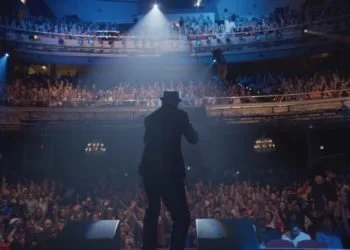Review: Harlem’s cathedral of culture ‘The Apollo’ stands the test of time
By Robert Abele
A space like the Apollo Theater, Harlem’s high church of American music, didn’t just play host to up-and-comers, storied legends and energetic wannabes — it amplified the sound and spirit of black entertainment in a way that reverberated far outside its walls.
Any movie tasked with celebrating its 85 years as a cultural landmark would have its work cut out for it, which makes Oscar-winning filmmaker Roger Ross Williams’ beautifully turned, rich and moving documentary “The Apollo” a true gift for these turbulent, who-are-we? times: essential history and quintessential performance expertly woven together to remind us what lasting, vibrant artistry and community looks like. From the heyday of jazz to the sweetness of soul and the power of hip-hop — with the reality of race ever present — Williams offers up a celebration worthy of the Apollo’s legacy.
With its blend of the archival, the interviewed, and modern-day footage, the first miracle of the film is that it never feels overstuffed with talking heads, or perfunctorily assembled, or rushed in covering its many glories across nearly a century. It’s a real beating-heart tribute, always streaked with feeling, whether joyous or poignant. That’s partly because the theater’s spirit, from its Depression-era launch as a mixed hot spot at a time when black people couldn’t patronize nightclubs in their own backyard, always intertwined excellence in black entertainment — launching the careers of Ella Fitzgerald, Billie Holiday and Stevie Wonder, and cementing the live chops of countless others across music, dance and comedy — with the notion that simply being on that stage, in that audience, constituted not only a vital act of expression, but also a feeling of home. It’s why Williams always threads in footage old and new of the block’s streets and citizens among the glittering stories and stars, as if to stress that the Apollo was as much a good neighbor as a grand beacon.
Williams makes the potent choice to bracket this history with a verité glimpse of the Apollo’s behind-the-scenes preparation for a multimedia staging of Ta-Nehisi Coates’ galvanizing book, “Between the World and Me.” Coates’ words of ceaseless struggle and fierce belonging echo through the film as we see Holliday make the Apollo a safe space for protest music with “Strange Fruit” (which she was pressured not to perform), favorite son James Brown anthemize the civil rights era with “Say It Loud — I’m Black and I’m Proud,” and truth-to-power rap artists flood the stage in the ’80s.
Just as inspiring is the tradition surrounding the Apollo’s fabled amateur night — the world’s longest-running talent show, a lively format by which the untapped (who have included Ella Fitzgerald and Lauryn Hill over the years) can command the spotlight, and perhaps earn a famously boo-ready crowd’s hard-won love. But like a lot about the Apollo, it’s the opportunity to give voice to that which lies behind this beloved rite. Cincinnati student Bianca Graham traveled to New York by bus to perform a soaring rendition of Whitney Houston’s “I Have Nothing,” and when she tears up at the memory of a friend shot and killed by a cop, you can believe the theater’s soul must course through each and every respect-paying hopeful that hits its stage.
The anecdotes are like music too, with spirited tales of nerves, awe and camaraderie from Smokey Robinson, Leslie Uggams, Patti Labelle and Pharrell Williams, and necessary context from backstage overseers like former owner Bobby Schiffman, current President Jonelle Procope and historian/tour guide Billy Mitchell. From these reverent insiders, and Williams’ graceful stewardship, comes a lasting portrait of an artistic institution that’s seen ups and downs but continues to thrive by bringing people together and getting the most out of many of them. It’s hard not to forget an early clip of Ella Fitzgerald and what she heard way on that amateur night in 1934 when her then-unknown teenage self balked at following the crowd-slaying, legendary Edwards Sisters with her own meager dance routine.
A man yelled, “You’re out here, do something.” So she sang.



